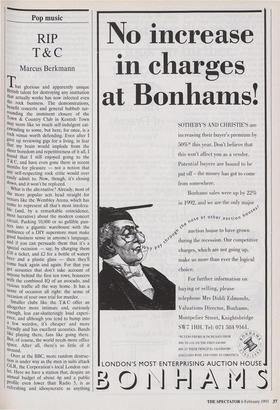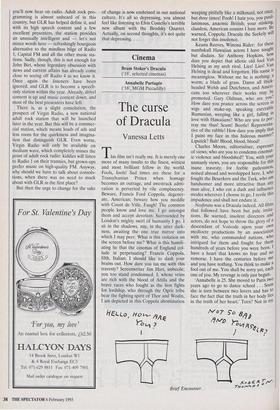Pop music
RIP T&C
Marcus Berk mann
That glorious and apparently unique British talent for destroying any institution that actually works has now infected even the rock business. The demonstrations, benefit concerts and general hubbub sur- rounding the imminent closure of the Town & Country Club in Kentish Town may seem like so much self-indulgent cat- erwauling to some, but here, for once, is a rock venue worth defending. Even after I gave up reviewing gigs for a living, in fear that my brain would implode from the sheer boredom and repetitiveness of it all, I found that I still enjoyed going to the T& C, and have even gone there in recent months for pleasure — not a notion that any self-respecting rock critic would ever easily admit to. Now, though, it's closing down, and it won't be replaced. What is the alternative? Already, most of the more popular acts head straight for venues like the Wembley Arena, which has come to represent all that's most intolera- ble (and, by a remarkable coincidence, Most lucrative) about the modern concert circuit. Packing 10,000 or so gullible pun- ters into a gigantic warehouse with the ambience of a DIY superstore must make good business sense in anyone's language, and if you can persuade them that it's a special occasion -- say, by charging them £18 a ticket, and £2 for a bottle of watery beer and a plastic glass — then they'll come back again and again. For that you get acoustics that don't take account of anyone behind the first ten rows, bouncers with the combined IQ of an avocado, and vicious traffic all the way home. It has a sense of occasion all right: the sense of occasion of your own trial for murder. Smaller clubs like the T & C offer an altogether more intimate and, curiously enough, less ear-shatteringly loud experi- ence, and although you tend to bump into a. few weirdos, it's cheaper and more friendly and has excellent acoustics. Bands like playing there, fans like going there. But, of course, the world needs more office space. After all, there's so little of it around.
Over at the BBC, more random destruc- tion is under way as the men in suits attack GLR, the Corporation's local London out- let. Here we have a station that, despite an annual budget of about 4p and a public profile even lower than Radio 5, is as refreshing and idiosyncratic as anything you'll now hear on radio. Adult rock pro- gramming is almost unheard of in this country, but GLR has helped define it, and with its high speech content and a few excellent presenters, the station provides an unusually intelligent and — let's not mince words here — refreshingly bourgeois alternative to the mindless bilge of Radio 1, Capital FM and all the other music sta- tions. Sadly, though, this is not enough for John Birt, whose legendary obsession with news and current affairs has already come close to seeing off Radio 4 as we know it. Once again the listeners have been ignored, and GLR is to become a speech- only station within the year. Already, drivel content is up and music content down, and most of the best presenters have left.
There is, as a slight consolation, the prospect of Virgin Radio, a new national adult rock station that will be launched later in the year. But this will be a commer- cial station, which means loads of ads and less room for the quirkiness and imagina- tion that distinguish GLR. Even worse, Virgin Radio will only be available on medium wave, which completely misses the point of adult rock radio: kiddies will listen to Radio 1 on their trannies, but grown-ups prefer music on high-quality FM. Anyway, why should we have to talk about consola- tions, when there was no need to muck about with GLR in the first place?
But then the urge to change for the sake of change is now enshrined in our national culture. It's all so depressing, you almost feel like listening to Elvis Costello's terrible new album with the Brodsky Quartet. Actually, on second thoughts, it's not quite that depressing. . . .























































 Previous page
Previous page